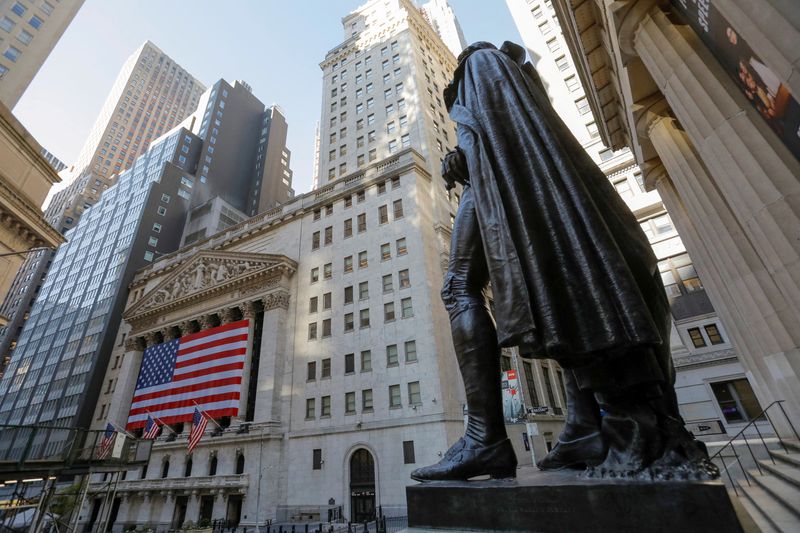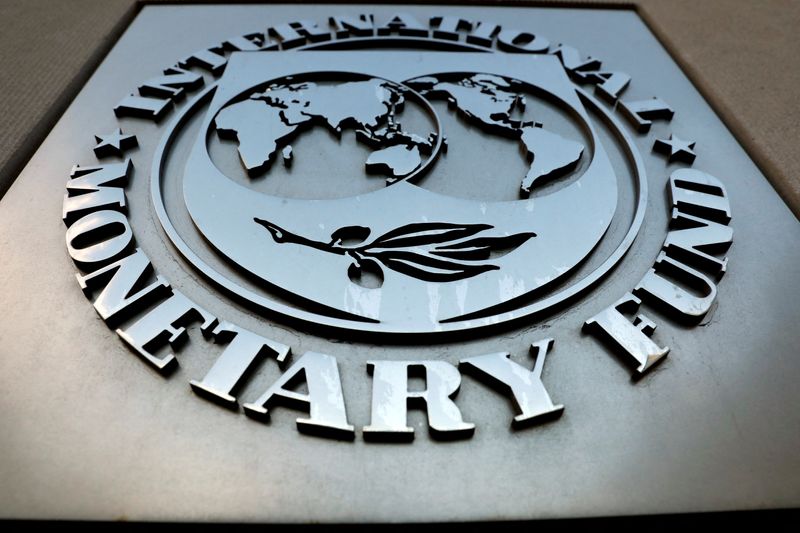(Refiles to fix date to April 27 not April 26)
By Sujata Rao and Dhara Ranasinghe
LONDON (Reuters) - After months focusing on central banks' response to raging inflation, financial markets are being jolted into the realisation that a global economic downturn may now loom.
Sentiment dampeners include the Ukraine war, huge rises in energy and metals prices, aggressive central bank policy tightening led by the U.S. Federal Reserve, and China's policy of locking down cities to ward off COVID.
The International Monetary Fund and World Bank fanned growth fears further last week when they cut 2022 global forecasts by nearly a full percentage point.
Financial analysts too are increasingly pessimistic, with Deutsche Bank (ETR:DBKGn) seeing an "outright" U.S. recession by end-2023.
Omens are flying in thick and fast.
They include warnings this week from shipping groups Maersk and Kuehne & Nagel about falling container volumes, and parcel service UPS predicting e-commerce growth to cool. Deutsche Bank, reporting earnings on Wednesday, flagged credit losses could rise "significantly".
On the data front, U.S. new home sales hitting two-year lows, weakening British and German consumer sentiment and new factory orders all point to slowing growth momentum.
Investors have reacted by pushing bond yields off recent multi-year highs, driving down oil prices from 14-year peaks and dumping currencies such as the Australian dollar and Brazilian real that had, until recently, surfed the commodity boom.
"The market likes to try and look to the next big thing," said Craig Inches, head of rates at Royal London Asset Management. "For the last few months, it has been focused purely on inflation but now it's starting to focus on recession."
Inches is not in the recession camp, but reckons central banks' determination to go faster with rate rises "has made people think, well, what does that mean for future growth concerns? Does that mean we are moving towards a harder landing?"
Still, with global inflation at multi-decade highs, the tensions with growth may play out over months, forcing investors and policymakers alike to walk the thin line between the two.
Morgan Stanley (NYSE:MS) strategist Mike Wilson outlines a 'fire and ice' scenario, where the Federal Reserve tightens policy into an economic slowdown.
Last week's stock market selloff, especially weakness in materials and energy, were signs "of the market's realization that we are now entering the 'ice phase' where growth becomes the primary concern for stocks, rather than inflation, the Fed, and interest rates," Wilson said in a podcast.
World stocks have fallen 8% this month, but cyclical shares, closely correlated with economic growth, have lost 10%.
Graphic: IFO and recessions - https://fingfx.thomsonreuters.com/gfx/mkt/lgvdwgnrrpo/Pasted%20image%201650963019307.png
Graphic: Cyclical stocks - https://fingfx.thomsonreuters.com/gfx/mkt/znpnemkyqvl/Pasted%20image%201650962778905.png
SHOW ME
Reading the recession tea leaves is not easy, and economists use a raft of indicators, including signals from equity and bond markets, to interpret the outlook.
The foremost is the U.S. Treasury market, especially the closely-watched gap between 2- and 10-year bond yields. An inversion in this curve -- when shorter-dated yields rise above longer counterparts -- usually means a recession within two years.
The curve inverted in early-April and is now around 20 basis points, levels that show recession fears remain on investors' minds.
It is probably too early to say a rethink is underway on where U.S. interest rates might top out, but money market expectations for the so-called terminal rate have eased since Friday by around 30 bps.
Similarly, futures on the euro zone interbank rate, Euribor, show implied yields for March 2024 fell below December 2023 yields last week, and implied yields are seen falling until end-2024.
That suggests "(the ECB) will tighten too much, so they will (then) need to ease monetary policy", said Danske Bank chief analyst Piet Christiansen.
Above all, worth noting is China, where a 3.5% yuan decline in April raises questions on whether authorities are permitting currency weakness to support the economy.
Fathom Consulting's China Momentum Index, unifying freight volumes, power consumption and bank loans, may bear watching. The gauge, reportedly favoured by Premier Li Keqiang, fell to 4.6% in January, from 24 last February.
Latest lockdowns will likely pressure the index further.
Graphic: China momentum indicator - https://fingfx.thomsonreuters.com/gfx/mkt/myvmnykdapr/Pasted%20image%201650962325785.png
COMPLICATED
Deutsche Bank aside, few expect a U.S. recession next year. Goldman Sachs (NYSE:GS) for instance sees a 15% probability over the next year, rising to 35% over two years.
Valentijn van Nieuwenhuijzen, chief investment officer at NN Investment Partners, pointed to the resilience of Purchasing Managers' Indexes (PMIs), forward-looking activity indicators, and pent-up demand for goods and services.
Graphic: Dr Copper - https://fingfx.thomsonreuters.com/gfx/mkt/dwpkryeodvm/Pasted%20image%201650961269566.png
"We have been positively surprised how well corporates were able to protect their margins and profitability...so our base case remains a soft landing," he said.
Still, the uncertainty is bringing some money back to government debt; BofA for instance recommends a 'long' Treasuries position, essentially a bet bond prices will rise.

U.S. inflation peaked last month and real GDP growth is set to peak this quarter, the bank reckons.
(The story refiles to fix date to April 27 not April 26.)
